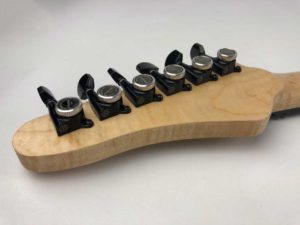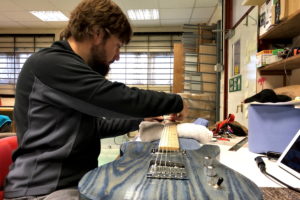George Beauchamp didn’t realise back in 1937 that his invention of the electric guitar pickup was going to change everything. Electric guitars now come in just about every shape and size. Some are mass produced, while others are hand made by small luthiers or boutique builders. The electric guitar created a revolution in music, which in turn changed our very culture. It’s hard to imagine what a world without rock and roll or Jimmy Hendrix would be like today.
Electric guitars fall into two broad categories: Mass produced instruments on the one hand; custom and custom shop instruments on the other. This article sheds light on the differences and nuances of custom, bespoke and custom shop electric guitars.
- What is the anatomy of an electric guitar?
- What is the difference between custom and custom shop?
- What is a boutique guitar?
- What guitar do most professionals use?
- How much would a custom guitar cost?
- What makes an old guitar valuable?
- What guitars are most collectible?
- Are there any British guitar manufacturers?
- How to commission a custom guitar
What is the anatomy of an electric guitar?
The electric guitar is made up of four core elements. The body, neck & fretboard, pickups & electronics, and hardware including the bridge and machine heads.
The body, neck, head, fretboard, bridge, and tuners/machine heads are found on all guitars, with pickups and electronics being the key elements that sets apart electric guitars.
At the heart of an electric guitar lies the body, typically crafted from a variety of tonewoods such as alder, mahogany, or ash. The body’s shape and contours not only influence the instrument’s aesthetics but also impact its resonance and playability.

Attached to the body is the neck, usually constructed from maple, mahogany, or other hardwoods. The neck includes the fretboard, which is typically made of rosewood, ebony, maple or modern materials such as [RichLite], and inlaid with frets for precise note placement.
The headstock is one of the most identifiable parts of a guitar. Different brands will each have their own designed headstock that comes to reflect their brand or a particular model. The Fender Stratocaster headstock design has evolved over the years, but even without seeing the rest of the guitar, you can identify the model from the shape of the headstock.

Running along the fretboard are the frets, thin metal strips embedded into the fretboard at precise intervals. These frets allow players to produce different pitches by pressing down on the strings. Frets are made from nickel silver and stainless steel. Nickel silver is the traditional material used, but stainless steel is fast becoming a fret material of choice due to its resistance to wear.
Mounted in the body are the pickups, electromagnetic devices that capture the vibrations of the strings and convert them into electrical signals. Most electric guitars feature two or more pickups, each with its own distinctive sound.
The tone the pickups output can be controlled and modified using the onboard electronics. The output of the pickups can be changed using the tone potentiometer (pot), and the volume is controlled using the volume pot. Under the covers there is a vast array of control design options available. This is an area that guitarists often want greater or fewer options, depending on their playing style.
Finally, the hardware includes the bridge and machine heads round out the anatomy of an electric guitar. These provide stability and intonation for the strings.
Understanding the anatomy of an electric guitar is essential for luthiers and players alike. The more you understand your instrument, the more effective you will be when trying to create your own unique sound.
Custom guitars add the opportunity to customise just about everything that makes up a custom guitar. Understanding the anatomy of an electric guitar helps when you want to commission your own custom guitar. Having said that, your luthier will guide you through the process of creating your custom guitar which will make it an easy and enjoyable process.
What is the difference between custom and custom shop?
The key difference between custom and custom shop guitars lies in the level of customisation and craftsmanship. Custom guitars are entirely bespoke, crafted from the ground up. Custom shop guitars offer a curated selection of options on established models. Both categories represent the epitome of quality and attention to detail, catering to discerning players who seek instruments as unique as their musical voice.
Custom guitars are bespoke, meaning that each instrument is meticulously crafted from scratch for the guitarist that commissions it. This allows for complete customisation of every aspect from tonewoods and hardware to electronics and aesthetics. Custom guitars represent the pinnacle of personalisation, offering players the opportunity to bring their unique musical vision to life.
Custom shop guitars are produced by established guitar manufacturers or boutique workshops with a reputation for excellence. While not entirely bespoke like custom guitars, custom shop instruments offer a higher level of customisation compared to standard mass production models. Players can choose from a range of options, including finishes, hardware, and pickups, to create a guitar that suits their preferences and style.
What is a boutique guitar?
A boutique guitar is an instrument made by a small guitar builder. They have typically between one and five people designing and building guitars. The guitars made by boutique builders are mostly custom or custom shop. While large and mass producers may also build custom shop guitars, they are not classed as boutique builders due to their size.

Boutique guitar builders tend to offer a level of customisation and personalisation that can’t be matched by larger producers. Players have the opportunity to work closely with the luthier, tailoring every aspect of the instrument to their unique preferences and playing style.
When you commission a guitar with a boutique builder, you get the choice of what materials and components are used. Depending on the builder, this can range from a variety of third party products configured in the way you want them to custom built the components for your specific guitar.
Working with a boutique builder is a different experience than that of large and mass producers. It is a personal service, where you interact with the luthier who actually designs and builds your guitar. A boutique builder takes the time to get to know their clients and to understand them, their playing style and exactly what they are looking for in their new instruments.
What guitar do most professionals use?
Iconic models like the Fender Stratocaster and Gibson Les Paul are staples for many professional guitarists. Renowned for their versatile tones and timeless designs, these guitars have left their mark on music history and remain go-to choices for players across genres. But there is no one-size-fits-all answer; several guitar brands and models have earned favour amongst seasoned professionals.

The guitar choice of professionals varies based on personal preference, playing style, and musical genre. While some brands and models tend to dominate the professional landscape, the most important factor is finding a guitar that inspires creativity, facilitates expression, and resonates deeply with the player’s musical journey.
Many professionals opt for custom built guitars tailored to their exact specifications by luthiers and boutique workshops. They are looking for an instrument that will make a statement and help to set them apart from the usual Fenders and Gibsons players. Custom guitars give them an instrument that is unique in both looks and sound.
How much would a custom guitar cost?
Custom guitar pricing varies widely, reflecting the intricacy of design, choice of woods, electronics, and hardware. Entry-level custom shop guitars may start around £1500 to £3000, embodying exceptional quality and personalised touches without breaking the bank. Mid-range custom or bespoke offerings, often crafted by seasoned luthiers, typically range from £3000 to £6000, offering a balance of premium materials and meticulous craftsmanship.
At the high-end, custom guitars can command prices upwards of £10,000 or more. These instruments are made by the best luthiers and offer the customer complete and unique creative control on what their guitar looks, feels, and plays like.
A conversation with many luthiers is free. A good one will take into account what you’re looking for and your budget, and they will be able to create an estimate for your new guitar.
What makes an old guitar valuable?
The value of an old electric guitar is determined by a combination of its historical significance, rarity, condition, and desirability among collectors. There is an enduring appeal of vintage instruments and the passion they evoke among musicians and collectors alike. The allure of vintage instruments lies in their rich history, craftsmanship, and tonal character, making them highly sought after.
A key factor that makes an old electric guitar valuable is its historical significance. Instruments associated with legendary musicians or pivotal moments in music history can command staggering prices. Take, for example, the 1959 Gibson Les Paul Standard “Burst.” Known for its iconic sound and exquisite craftsmanship, this guitar has become one of the most coveted instruments in the world, fetching prices upwards of £450,000 at auction.
Another factor is the rarity of the instrument. Limited production runs, unique features, and sought-after models contribute to the scarcity of certain guitars, driving up their market value. For instance, the 1958 Fender Stratocaster in “Mary Kaye” blonde finish is highly prized among collectors for its rarity and distinctive aesthetics, often selling for over £20,000 in today’s market.
As an example of how old guitars hold their value. A 1954 Stratocaster with a case would have cost $317 when new. If you adjust for inflation that would be $3,590 in today’s money. However, a ‘54 Strats are fetching upwards of $100,000 today. The David Gilmore ’54 Strat fetching 1,815,000 at auction in June 2019.
What guitars are most collectible?
Vintage guitars from iconic brands such as Gibson, Fender, and Martin are amongst the most collectible guitars. Models like the 1959 Gibson Les Paul Standard, the 1958 Fender Stratocaster, and the acoustic 1930 Martin OM-45 Deluxe stand as shining examples of instruments coveted by collectors worldwide.
Beyond vintage classics, guitars associated with legendary musicians hold a special allure for collectors. Instruments played by icons like Jimi Hendrix, Eric Clapton, and Jimmy Page fetch astronomical prices at auctions. They embody the essence of rock and roll history and cultural significance. Instruments with proof of history, or provenance, with famous musicians are much more desirable to collectors.
Limited edition models, custom shop creations, and guitars crafted by esteemed luthiers also rank among the most collectible. These unique instruments can offer a blend of superior craftsmanship, innovation, and exclusivity.
In the landscape of guitar collecting, rarity, provenance, and condition are key factors in determining collectability. Whether vintage classics, iconic models, or bespoke creations, the most collectible guitars are timeless treasures.
Read about the art of collection guitars.
Are there any British guitar manufacturers?
Munson Guitars is one of the leading British guitar manufacturers. We have earned a reputation for producing exceptional instruments that marry traditional craftsmanship with modern design elements. Our guitars are celebrated for their impeccable playability, rich tonal character, and meticulous attention to detail, making them sought after treasures among players and collectors alike.

In addition to Munson Guitars, the United Kingdom boasts a rich tradition of guitar craftsmanship, with several notable manufacturers contributing to the global guitar market. Other British manufacturers such as Patrick James Eggle, Manson Guitar Works, and Gordon Smith Guitars have left an indelible mark on the industry. These companies embody the spirit of British guitar making, producing instruments of exceptional quality and character that rival their counterparts from around the world.
With their dedication to excellence and a proud heritage of craftsmanship, British guitar manufacturers continue to shape the landscape of the guitar industry, offering players a diverse array of instruments that capture the essence of British ingenuity and artistry.
How to commission a custom guitar
Commissioning either a custom and custom shop guitar is a journey from concept to concert. We call this journey the Custom Guitar Experience. The Munson Guitars custom guitar experience is a tried and tested process which brings you, virtually, into the design studio and workshop, so you can be as involved in all aspects of the project as possible.

Start your own custom guitar journey today. We have everything from fully bespoke to custom shop guitars that can be tailored to your unique needs. Schedule a free, no obligation call with our luthier to discuss your ideas.
